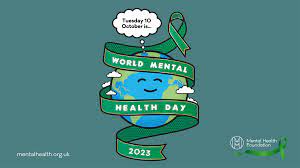In this blog I want to explore the theme for this year’s World Mental Health Day.
I have never considered mental health in these terms before – so I went away and did a bit of research. Here’s where my thinking has got to, as a result.
All comments welcome.
The starting point is that most people now recognise that human rights go beyond the basics of food, shelter, and safety. Positive Mental Health is a fundamental part of leading a happy and fulfilling life and should be considered a human right as well.
But, before I explore why, we need to answer a basic question: What Is Positive Mental Health?
Positive mental health isn’t just the absence of mental illness. It’s about feeling emotionally strong, being psychologically well: having the ability to handle life’s ups and downs. Someone with positive mental health has a sense of purpose and the capacity to build meaningful relationships. It’s about being able to lead a productive and happy life.
So, why should positive mental health be a human right? Here are some thoughts under four headings:
Dignity and Respect
At the core of the argument is the idea of human dignity. Everyone deserves to be treated with respect and live a life with dignity.
Discrimination
Discriminating against someone because of their mental health is a big problem in many places. It’s also crucial to think about how different human rights intersect with mental health. Some groups, like those living in poverty, refugees, LGBTQ+ individuals, and people of colour, often face inequality, both in the way they are treated and in access to mental health support.
Freedom from Harm
Unfortunately, people with mental health conditions often face neglect and mistreatment around the world. Evidence, including extremes such as torture, and cruel, inhuman and degrading treatment are well documented, including, in many, so called, First World countries.
Economic and Social inequity
Mental ill-health affects economic and social circumstances. Someone who struggles with poor mental health may find it hard to get a job, go to school or be an active part of social life, leading to a isolation and hardship.
Conclusion
And so, my conclusion? We should indeed consider mental health as a basic human right. By doing this we:
- Start to build a society that respects the worth of every individual, no matter their mental health status
- Are taking a step toward addressing discrimination and ensuring that everyone has equal access to support
- Start protecting people from mistreatment and harm, ensuring they’re treated with respect
- Begin to protect everyone’s economic and social rights equally
The idea that positive mental health is a human right is rooted in treating people with dignity and equality. Recognising this right has huge implications for individuals and society. It calls for an end to stigma, the promotion of inclusion and the availability of quality mental health care and support.
Ultimately, seeing positive mental health as a human right isn’t just morally right – it’s essential for people to flourish. 
These are my thoughts – do you agree? Disagree? Let’s get a discussion going. glen@ridgwayworkplacementalhealth.co.uk

